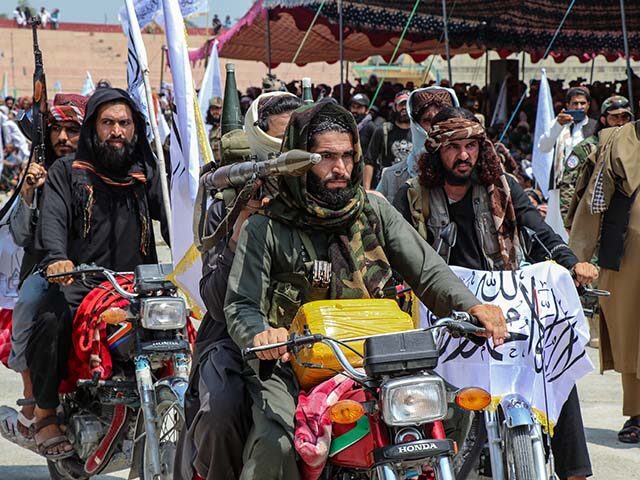The official state news agency of Afghanistan, under the control of the ruling Taliban, claimed in a report on Monday that the United Nations Political Mission for Afghanistan (UNAMA) was working to “facilitate small-scale projects through loan provisions” in a now-deleted article.
The official Bakhtar News Agency reported in a separate article still available on its site that the head of UNAMA, Roza Otunbayeva, more broadly said her agency would work in “assisting farmers” with “resources,” without elaborating.
It is not clear at press time why the Bakhtar News Agency deleted the article, which can still be read through Google’s cache of archived websites. The promise to help local farmers with loans – absolving the Taliban of a government responsibility and thus allowing it to fund terrorist and other nefarious activities instead of social services – followed an attempt by UNAMA to condemn the Taliban this weekend, however, in response to its newly debuted repressive “moral” code. The U.N. agency tasked with Afghanistan affairs published an extended statement describing as “distressing” a new series of decrees that bans women from showing their faces of speaking in public, as well as applying less stringent dress codes over men.
The United Nations has, since the Taliban’s return to power in 2021, attempted to both condemn its brutal implementation of Islamic sharia legal codes and to fund what it claims to be humanitarian efforts to ensure the Afghan people are properly clothed, sheltered, and have access to health care and other services. The result has been a largely incoherent policy in which the United Nations does not formally recognize the Taliban as the government of Afghanistan but its agencies regularly engage Taliban leaders and fund services in the country that should be the responsibility of the government.
The context of Otunbayeva’s alleged remarks on funding more programs for the Taliban was a visit to Kandahar, the second-largest city in Afghanistan, in which she met with the Taliban’s “deputy governor” of the province, Mullah Sadiq Enqelabi.
“We are working with the Central Bank of Afghanistan to facilitate small-scale projects through loan provisions,” Bakhtar had originally quoted Otunbayeva as saying in conversation with Enqelabi.
“In response, Deputy Governor Enqelabi expressed gratitude for the UN’s assistance and urged the international community to avoid excuses for not investing in Afghanistan,” Bakhtar claimed. “He also called for the implementation of fundamental projects and further cooperation in areas such as alternative crops and treatment for drug addiction.”
The issue of opium cultivation in Afghanistan has been a decades-long challenge, as Afghanistan has traditionally been the world’s top opium producer. Under the Taliban terrorists, the nation lost that title to Myanmar in December. Taliban leaders have argued that a major obstacle to eradicating all opium is that it is one of the most lucrative crops for impoverished local farmers, meaning the farmers need subsidies or other support to transition towards growing legal plants.
The updated version of Bakhtar’s coverage of Otunbayeva’s time in Kandahar quoted the official as stating that the United Nations sought “to work with the local government to provide farmers in Kandahar with the resources they need to transition to legal, sustainable crops.”
Outside of the pages of Bakhtar, the relationship between the Taliban and UNAMA appeared much more contentious this week, as the agency condemned the passage of the updated Afghan “morality” code. The “Ministry of Vice and Virtue” decree outlaws women leaving the house while showing their faces “due to the fear of causing temptation” and also outlawed women speaking in public, as “the loud voice of women is also considered a part of their modesty.” The decree apparently left open the matter of whether it would be legal for women to whisper in public or not but did explicitly ban “singing, chanting, and recitation.”
The decree also banned men from wearing neckties or shaving their faces, as well as prohibiting unspecified haram “hairstyles.”
“It is a distressing vision for Afghanistan’s future, where moral inspectors have discretionary powers to threaten and detain anyone based on broad and sometimes vague lists of infractions,” Otunbayeva, the UNAMA chief, said in a statement on Sunday. “It extends the already intolerable restrictions on the rights of Afghan women and girls, with even the sound of a female voice outside the home apparently deemed a moral violation.”
UNAMA said it was “seeking clarification” from the Taliban on how it intended to enforce the new law.
The Taliban responded publicly on Tuesday by condemning UNAMA’s complaints as “baseless” and a form of “arrogance.”
“Every law, every article and clause has been derived from the reliable and accepted sources of jurisprudence,” Taliban spokesman Zabihullah Mujahid wrote in the statement.
“No one is worried about the implementation of these Islamic laws, the laws are not a limitation for anyone, no one is violated, and no one is oppressed,” Mujahid insisted. “These laws will be implemented in appropriate ways and will be used with utmost lenience in their implementation.”
“Such unnecessary concerns from different directions cannot have any effect on the position of the Islamic Emirate, because we have made countless sacrifices for the implementation of the Sharia and in this regard we are committed to the holy dreams of our mujahid nation and martyrs,” Mujahid concluded.
The response to UNAMA follows the decision by the Taliban in late August to ban the United Nations Special Rapporteur for Human Rights in Afghanistan Richard Bennett from entering the country. Taliban jihadists refused to grant Bennett a visa, later accusing him of attempting to create “propaganda” against the regime in the country.
“Even after repeatedly requesting Mr. Bennett to adhere to professionalism during work … it was decided that … his reports are based on prejudices and anecdotes detrimental to (the) interests of Afghanistan and the Afghan people,” Taliban “foreign ministry” spokesman Abdul Qahar Balkhi said.

COMMENTS
Please let us know if you're having issues with commenting.